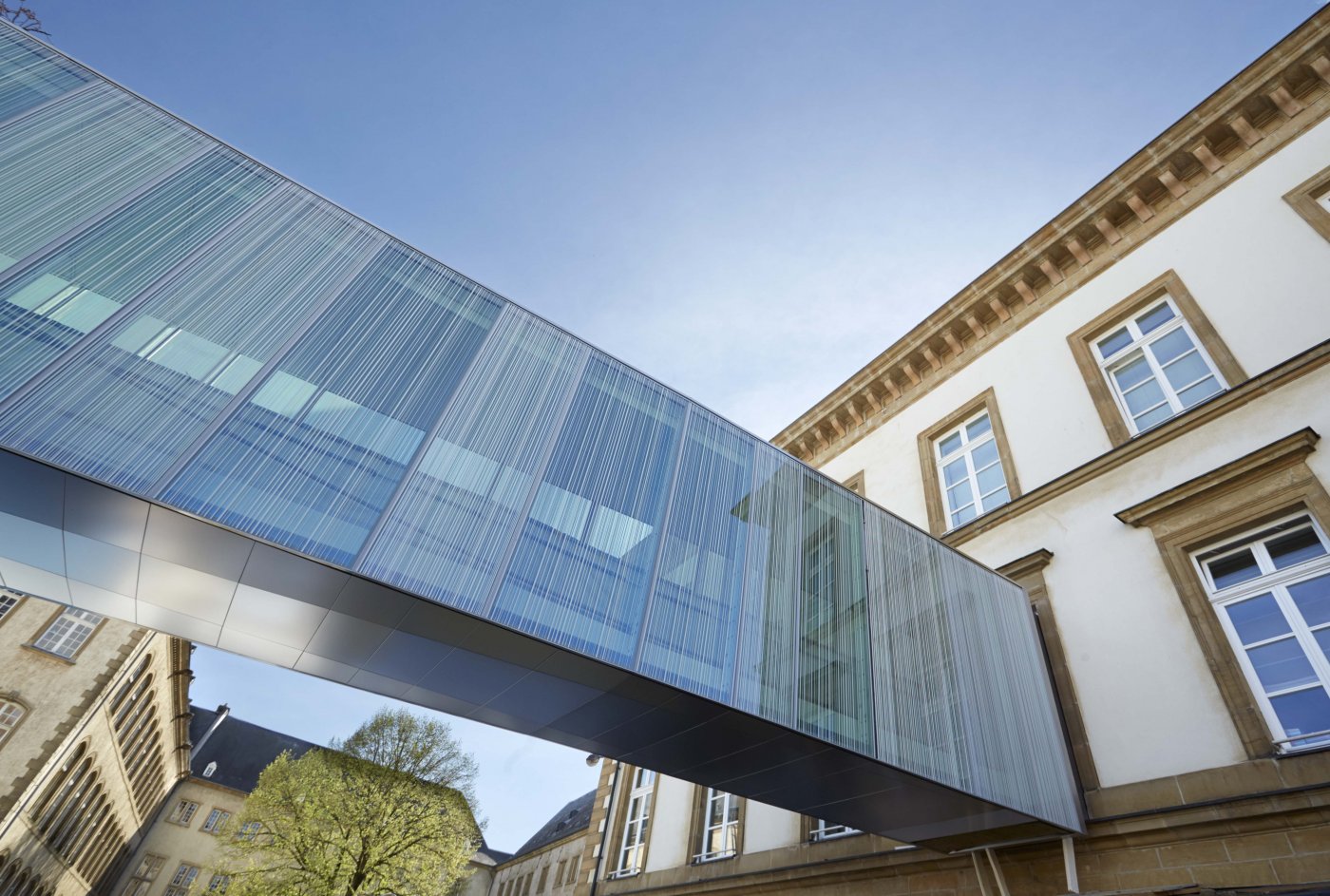Rapport analytique
Retransmission en direct de la séance
Rubbish at Place Guillaume after the "Fridays for future" demonstration
Question from Tom Krieps
As municipal councillor, I would like to ask a question concerning the recent "Fridays for future" demonstration that culminated at Place Guillaume.
Although the demonstration itself was peaceful and cheerful, controversy has arisen in the wake of malicious rumours to the effect that the young people had left the square littered with refuse.
One of the claims was that the venue was littered with huge numbers of plastic bottles.
- Can the City and its relevant departments confirm that the square was left in a perfectly satisfactory state after the thousands of demonstrators had left?
- Did the Service Hygiène (Sanitation Department) have any extra work to do to restore Place Guillaume II to its initial condition?
Response by Patrick Goldschmidt
Alderman Goldschmidt thanked the councillor for his question, which gave the City the opportunity to refute the false rumours that have been circulating about the behaviour of the young people who had taken part in the "Fridays for future" demonstration; these rumours had also been circulated by the media. He confirmed that the young people, who had come out in their thousands for the demonstration at Place Guillaume II, had behaved in a very civilised manner, and had not left behind any rubbish. He also confirmed that the City's Service Hygiène had no cause to undertake any extra work after the demonstrators had left the square, or along the route they had taken. While it was true that some refuse had been reported in a few locations, given the number of demonstrators, he could testify that 99.99% of them had conducted themselves in an exemplary manner, for which he thanked them.
CCTV surveillance in Bonnevoie
Question by Maurice Bauer
In a letter dated 20 March, you informed the members of the Comité de prévention communal (Municipal Prevention Committee) that the Minister of Internal Security (Ministre de la Sécurité intérieure), in response to our assessment, had designated a section of the Gare district (the Zone C extension), as well as the passageway for cyclists beneath Pont Adolphe, as security zones. The Minister also approved a CCTV system in the designated zones.
The decision comes as excellent news for the inhabitants of the Gare district, and especially those living near local primary schools, since it relates to a concern almost unanimously felt by local residents.
However, at its meeting of 27 November 2018, during which the Comité de prévention communal examined and approved the extension of CCTV surveillance to the Gare district (zone C), the Committee also unanimously approved a proposal to extend such surveillance to the Bonnevoie district (with only the "dei Gréng" representative voting against). That decision was taken with the aim of easing the daily concerns of the inhabitants of the residential district in Bonnevoie since the problems they experience in the district are still the same, despite the implementation of an array of measures as alternatives to CCTV surveillance.
The extension of CCTV surveillance to the Bonnevoie district was announced by the Deputy Prime Minister and the Minister of Internal Security – less than 6 months before the parliamentary elections – at a public meeting on 30 May 2018 on the topic of extending CCTV surveillance more widely in the Gare district. He even confirmed the decision in his response to parliamentary question no. 3919, posed by Claudine Konsbrück on 9 July 2018, concerning the streets that would be affected by these new extensions. The Minister replied: "It is also worth mentioning that there are plans to introduce other security zones, outside the Gare district, in the cycle passageway beneath Pont Adolphe and in Bonnevoie."
- Could you possibly remind us which streets are included in the extension that has been announced for zone C in the Gare district?
- Could you possibly remind us which streets in Bonnevoie have been designated, including those for which the Comité de prévention communal has requested an extension that has yet to be implemented?
- Have you been informed as to why the new Minister of Internal Security has not yet extended CCTV surveillance to Bonnevoie, despite the undertakings given by his predecessor and the persistent demands of Bonnevoie residents?
- Given the Comité de prévention communal's practically unanimous position on the matter and the justified discontent of the Bonnevoie residents, should not the college of aldermen remind the Minister of this decision and ask him to honour the undertakings given by his predecessor to extend CCTV surveillance to Bonnevoie?
Response by LYDIE POLFER
The Mayor and Chairwoman first of all asserted that she was satisfied with the decision to extend CCTV surveillance to the Gare district, the area in front of the train station, Place de la Gare, Rue de Strasbourg (between Rue Wilson and Avenue de la Liberté), Rue du Commerce (between Rue de Strasbourg and Rue du Fort Wedell), Rue du Fort Wedell, Place de Strasbourg, Rue Glesener, Rue 1900, Rue Adolphe Fischer (between Rue d'Anvers and Rue de Hollerich), Rue André Duchscher, Rue d'Anvers (between Place de Paris and Rue des Etats-Unis), Rue Wilson and Rue des Etats-Unis.
It is a step in the right direction, especially as this extension of CCTV surveillance is unanimously considered to be crucial, and moreover was requested by the vast majority of those present at the public meeting that was held in the Gare district.
Regarding Bonnevoie, detailed plans showing how CCTV surveillance would be extended were presented at the meeting: in and around Place Léon XIII, in Rue de Bonnevoie, Rue du Cimetière, Rue des Ardennes, Rue Sigismond, Rue de Hesperange and Rue du Dernier Sol, forming a triangle around the Bonnevoie cultural centre. The need is further underscored by the fact that the City receives complaints daily from residents of that district about their unbearable living conditions. The plan presented at this meeting has not required updating.
Moreover, Minister Bausch did not refuse to extend CCTV surveillance to the Bonnevoie district. He simply feels that a study of the impact of the extension in the Gare district should be carried out beforehand. Although the Mayor and Chairwoman approves of this decision-making process in principle, it must be acknowledged that the City maintains its position that the current situation in Bonnevoie wholly justifies the immediate approval of the extension, which was again emphasised at the meeting between the college of aldermen and Minister Bausch on 15 January 2019. In light of the photographs and videos that the City regularly receives, there is no doubt that the extension is needed.
Lastly, as the situation in that part of the district can be directly attributed to the high concentration of social welfare services in the area, which does not make life easier for local residents, the Minister has not actually refused to approve the extension but has simply postponed his decision. The Mayor and Chairwoman remains confident that a positive response will be soon forthcoming.
Distribution of access cards for the recycling centre
Question by Maurice Bauer
A week ago, the recycling centre began inviting users to apply for an access card, which will be required to enter the premises in the near future. Cards are issued on the spot after applicants have filled in a form and accepted the terms and conditions of use.
The following questions therefore arise:
- Who is currently authorised to enter the recycling centre? Only private individuals, or business users as well?
- Will access be restricted to card-holding users only?
- Who can obtain an access card? Only private individuals living in the municipalities of Luxembourg and Strassen, or business users as well?
- When will the requirement to produce an access card to enter the premises come into effect?
Response by Patrick Goldschmidt
The recycling centre is currently open to all residents in the municipalities of Luxembourg and Strassen, whether they have an access card or not. Since 2014, businesses located in either of these municipalities have also been able to use the site, but require an access card to do so.
Ultimately, access to the recycling centre will be restricted to card holders only. As such, users of the recycling centre are currently being asked to fill in a form to apply for the card.
The card is made out in the applicant's name and issued to the applicant personally – rather than on a per-vehicle basis – provided they are of legal age.
The date from which access to the recycling centre will be restricted to card holders only has not yet been set. Once the City has determined that most users have obtained a card, access will then be restricted to card holders only.
Lastly, the collection of applicants' personal data, as provided in the form, is compliant with legislation currently in force.
Proposed reopening of Rue des Celtes to and from Leudelange
Question by Héloïse Bock
On 11 March 2019, the Belair-Merl local interest group (Syndicat d'intérêts locaux – SIL) requested an interview with the college of the mayor and aldermen to voice their concerns about the apparently urgent government project to replace one of the two level crossings on Rue des Celtes with an underpass including a road for motor vehicles, a pavement for pedestrians and a cycle lane.
Moreover, according to the information at our disposal, the project does not even provide for the construction of a proper cycle lane, but simply for markings on the ground with no appropriate safety measures.
In this context I would like to remind the college that the level crossing in question has been closed since 2012, and that several alternative routes are available to motorists travelling between Leudelange and Luxembourg City. I would also like to remind the college of the City's constant requests to the Government for the construction of a boulevard between Cessange and Merl that would reduce in-transit traffic in the residential districts to the west of Luxembourg City. I am referring, of course, to the very same project that has been mentioned in the college's declarations for many years but which has yet to see the light of day.
In its letter, the Belair-Merl SIL put forward a number of relevant arguments supporting the view that the reopening of this thoroughfare, in a residential district, should be restricted to active travel only.
As everyone knows, traffic on Rue de Merl is extremely heavy. Given the dense traffic that would be caused, the intersection of the two streets would most likely become not only heavily congested but dangerous as well. Furthermore, Rue des Celtes joins this street near a very busy primary school, and there is a foyer scolaire (childcare centre) some 300 metres away; children attending this centre are already forced to take a bus because of the danger posed by vehicular traffic.
In light of this, I would like to ask the following questions:
- Has the audience requested by the Belair-Merl SIL taken place?
- If so, what was the outcome?
- Would the college of aldermen be willing to approach the government to present the arguments put forward by the SIL and make a case for restricting the proposed underpass on Rue des Celtes to active travel?
- If such a restriction were to be accepted, would it not be wise to go one step further and redesignate Rue des Celtes as a "Spillstrooss", with a secure cycle lane that cyclists – adults and children alike – could use without fear for their safety?
Response by Patrick Goldschmidt
Alderman Goldschmidt confirmed that the Belair-Merl Local Interest Group had indeed sent a letter dated 11 March 2019, explaining the problem and detailing the arguments which, in their opinion, justify closing Rue des Celtes. He went on to remind the meeting that, even though an audience was not expressly requested in the letter, the college of aldermen arranges at least one audience a year with every local interest group. Accordingly, an interview with the Belair-Merl SIL was held in January 2018. The problem of Rue des Celtes was discussed at that meeting and the college of aldermen told the SIL that it would endeavour to keep the street closed, while also referring to the parliamentary question put to the Chamber of Deputies in 2017. The government was only recently able to commence the required works in Leudelange, as the legal proceedings in connection with the compulsory purchases planned by the government concluded only last year. As such, in theory, given its relative importance as a thoroughfare, Rue des Celtes could be reopened. However, the City is more inclined to take the view that reopening Rue des Celtes is not justified and will discuss the matter with the Minister at their next meeting. The City is of the view that since the closure of Rue des Celtes has not given rise to any major traffic problems, there is no reason not to close it permanently. Only a handful of residents and farmers would need to make a short detour via Rue du Bouillon.
Alderman Goldschmidt also reminded the meeting that the decision to reopen Rue des Celtes or keep it closed is not within the remit of the City authorities, but of the Ministry. He confirmed, however, that the City would ask the Minister to reconsider his decision to reopen Rue des Celtes to motor traffic.
















